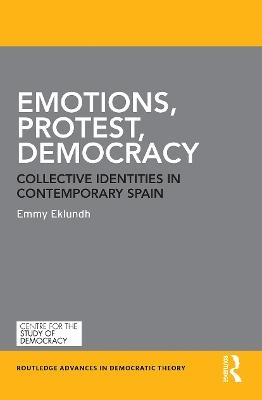
Emotions, Protest, Democracy
Collective Identities in Contemporary Spain
Seiten
2021
Routledge (Verlag)
978-1-032-24154-8 (ISBN)
Routledge (Verlag)
978-1-032-24154-8 (ISBN)
Using radical theories of democracy, Eklundh constructs an analytical framework based on concept of visceral ties, seeing emotions and affect as constitutive of any collective identity. She later demonstrates empirically, using both ethnographic method and social media analysis, how the movement Indignados has stronger visceral ties than Podemos
With the rise of both populist parties and social movements in Europe, the role of emotions in politics has once again become key to political debates, and particularly in the Spanish case. Since 2011, the Spanish political landscape has been redrawn. What started as the Indignados movement has now transformed into the party Podemos, which claims to address important deficits in popular representation. By creating space for emotions, the movement and the party have made this a key feature of their political subjectivity. Emotions and affect, however, are often viewed as either purely instrumental to political goals or completely detached from ‘real’ politics. This book argues that the hierarchy between the rational and the emotional works to sediment exclusionary practices in politics, deeming some forms of political expressions more worthy than others.
Using radical theories of democracy, Emmy Eklundh masterfully tackles this problem and constructs an analytical framework based on the concept of visceral ties, which sees emotions and affect as constitutive of any collective identity. She later demonstrates empirically, using both ethnographic method and social media analysis, how the movement Indignados is different from the political party Podemos with regards to emotions and affect, but that both are suffering from a broader devaluation of emotional expressions in political life.
Bridging social and political theory, Emotions, Protest, Democracy: Collective Identities in Contemporary Spain provides one of the few in-depth accounts of the transition from the movement Indignados to party Podemos, and the role of emotions in contemporary Spanish and European politics.
With the rise of both populist parties and social movements in Europe, the role of emotions in politics has once again become key to political debates, and particularly in the Spanish case. Since 2011, the Spanish political landscape has been redrawn. What started as the Indignados movement has now transformed into the party Podemos, which claims to address important deficits in popular representation. By creating space for emotions, the movement and the party have made this a key feature of their political subjectivity. Emotions and affect, however, are often viewed as either purely instrumental to political goals or completely detached from ‘real’ politics. This book argues that the hierarchy between the rational and the emotional works to sediment exclusionary practices in politics, deeming some forms of political expressions more worthy than others.
Using radical theories of democracy, Emmy Eklundh masterfully tackles this problem and constructs an analytical framework based on the concept of visceral ties, which sees emotions and affect as constitutive of any collective identity. She later demonstrates empirically, using both ethnographic method and social media analysis, how the movement Indignados is different from the political party Podemos with regards to emotions and affect, but that both are suffering from a broader devaluation of emotional expressions in political life.
Bridging social and political theory, Emotions, Protest, Democracy: Collective Identities in Contemporary Spain provides one of the few in-depth accounts of the transition from the movement Indignados to party Podemos, and the role of emotions in contemporary Spanish and European politics.
Emmy Eklundh is a Lecturer in Spanish and International Politics at King’s College London. Her research is mainly centred on the post-crisis eruptions of protest in Southern Europe and challenges to the European democratic order. Current research projects include the rise (or return) of left- and right-wing populist movements and parties in Europe.
Introduction: A Narrative of Three Crises
Part 1: Emotions
1. Emotion and Reason in Collective Action
2. Rationality, Consensus and Dissensus
3. The Contribution of Radical Democracy
Part 2: Protest
4. Understanding Movement Unity
5. Collective Identities on Social Media
Part 3: Democracy
6. From Movement to Party
7. Digital Participation and Sffect
Conclusion: Addressing the Crisis of Subjectivity
| Erscheinungsdatum | 14.12.2021 |
|---|---|
| Reihe/Serie | Routledge Advances in Democratic Theory |
| Zusatzinfo | 21 Illustrations, black and white |
| Verlagsort | London |
| Sprache | englisch |
| Maße | 152 x 229 mm |
| Gewicht | 367 g |
| Themenwelt | Sozialwissenschaften ► Politik / Verwaltung ► Politische Systeme |
| ISBN-10 | 1-032-24154-3 / 1032241543 |
| ISBN-13 | 978-1-032-24154-8 / 9781032241548 |
| Zustand | Neuware |
| Haben Sie eine Frage zum Produkt? |
Mehr entdecken
aus dem Bereich
aus dem Bereich
über Alltagsorte des sozialen Zusammenhalts
Buch | Softcover (2024)
transcript (Verlag)
CHF 33,55


